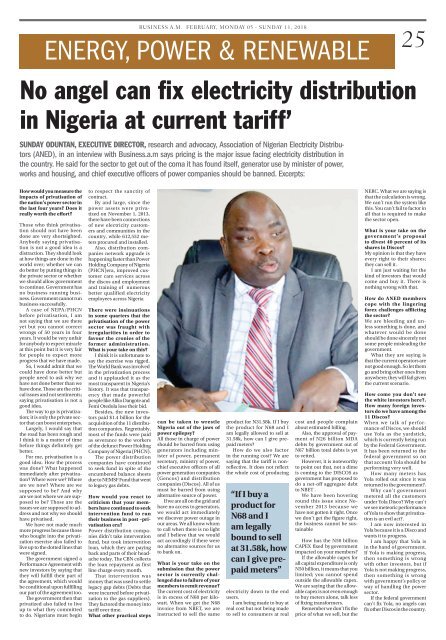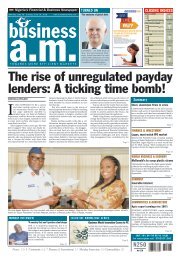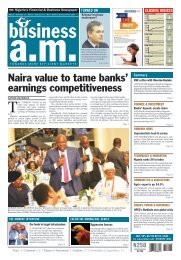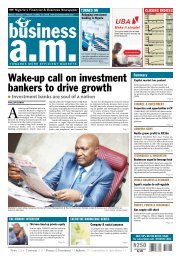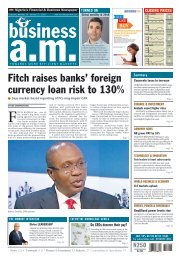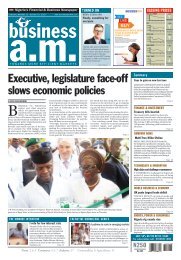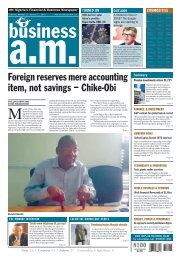Create successful ePaper yourself
Turn your PDF publications into a flip-book with our unique Google optimized e-Paper software.
BUSINESS A.M. FEBRUARY, MONDAY <strong>05</strong> - SUNDAY 11, 20<strong>18</strong><br />
ENERGY, POWER & RENEWABLE<br />
25<br />
No angel can fix electricity distribution<br />
in Nigeria at current tariff’<br />
SUNDAY ODUNTAN, EXECUTIVE DIRECTOR, research and advocacy, Association of Nigerian Electricity Distributors<br />
(ANED), in an interview with Business.a.m says pricing is the major issue facing electricity distribution in<br />
the country. He said for the sector to get out of the coma it has found itself, generator use by minister of power,<br />
works and housing, and chief executive officers of power companies should be banned. Excerpts:<br />
How would you measure the<br />
impacts of privatisation of<br />
the nation’s power sector in<br />
the last four years? Does it<br />
really worth the effort?<br />
Those who think privatisation<br />
should not have been<br />
done are very shortsighted.<br />
Anybody saying privatisation<br />
is not a good idea is a<br />
distraction. They should look<br />
at how things are done in the<br />
world over; whether we can<br />
do better by putting things in<br />
the private sector or whether<br />
we should allow government<br />
to continue. Government has<br />
no business running business.<br />
Government cannot run<br />
business successfully.<br />
A case of NEPA/PHCN<br />
before privatisation, I am<br />
not saying that we are there<br />
yet but you cannot correct<br />
wrongs of 50 years in four<br />
years. It would be very unfair<br />
for anybody to expect miracle<br />
at this point but it is very fair<br />
for people to expect more<br />
progress that we have made.<br />
So, I would admit that we<br />
could have done better but<br />
people need to ask why we<br />
have not done better than we<br />
have done. Those are the critical<br />
issues and not sentiments;<br />
saying privatisation is not a<br />
good idea.<br />
The way to go is privatization;<br />
it is only the private sector<br />
that can boost enterprises.<br />
Largely, I would say that<br />
the road has been rough and<br />
I think it is a matter of time<br />
before things definitely get<br />
better.<br />
For me, privatisation is a<br />
good idea. How the process<br />
was done? What happened<br />
immediately after privatization?<br />
Where were we? Where<br />
are we now? Where are we<br />
supposed to be? And why<br />
are we not where we are supposed<br />
to be? Those are the<br />
issues we are supposed to address<br />
and not why we should<br />
have privatised.<br />
We have not made much<br />
more progress because those<br />
who bought into the privatization<br />
exercise also failed to<br />
live up to the dotted lines that<br />
were signed.<br />
The government signed a<br />
Performance Agreement with<br />
new investors by saying that<br />
they will fulfill their part of<br />
the agreement, which would<br />
be conditional upon fulfilling<br />
our part of the agreement too.<br />
The government then that<br />
privatized also failed to live<br />
up to what they committed<br />
to do. Nigerians must begin<br />
to respect the sanctity of<br />
contract.<br />
By and large, since the<br />
power assets were privatized<br />
on November 1, 2013,<br />
there have been connections<br />
of new electricity customers<br />
and communities in the<br />
country, while 612,552 meters<br />
procured and installed.<br />
Also, distribution companies<br />
network upgrade is<br />
happening faster than Power<br />
Holding Company of Nigeria<br />
(PHCN)era, improved customer<br />
care services across<br />
the discos and employment<br />
and training of numerous<br />
better qualified electricity<br />
employees across Nigeria<br />
There were insinuations<br />
in some quarters that the<br />
privatisation of the power<br />
sector was fraught with<br />
irregularities in order to<br />
favour the cronies of the<br />
former administration.<br />
What is your take on this?<br />
I think it is unfortunate to<br />
say the exercise was rigged.<br />
The World Bank was involved<br />
in the privatization process<br />
and it applauded it as the<br />
most transparent in Nigeria’s<br />
history. It was that transparency<br />
that made powerful<br />
people like Aliko Dangote and<br />
Femi Otedola lose their bid.<br />
Besides, the new investors<br />
paid $1.4 billion for the<br />
acquisition of the 11 distribution<br />
companies. Regrettably,<br />
most of the funds were paid<br />
as severance to the workers<br />
of the defunct Power Holding<br />
Company of Nigeria (PHCN).<br />
The power distribution<br />
companies have continued<br />
to seek fund in spite of the<br />
encumbered balance sheets<br />
due to NEMSF Fund that went<br />
to legacy gas debts.<br />
How would you react to<br />
criticism that your members<br />
have continued to seek<br />
intervention fund to run<br />
their business in post –privatisation<br />
era?<br />
Power distribution companies<br />
didn’t take intervention<br />
fund, but took intervention<br />
loan, which they are paying<br />
back and parts of their headache<br />
today. The CBN collects<br />
the loan repayment as first<br />
line charge every month.<br />
That intervention was<br />
money that was used to settle<br />
legacy gap debts (Debts that<br />
were incurred before privatization<br />
to the gas suppliers).<br />
They factored the money into<br />
tariff over time.<br />
What other practical steps<br />
can be taken to wrestle<br />
Nigeria out of the jaws of<br />
power epilepsy?<br />
All those in charge of power<br />
should be barred from using<br />
generators including minister<br />
of power, permanent<br />
secretary, ministry of power,<br />
chief executive officers of all<br />
power generation companies<br />
(Gencos) and distribution<br />
companies (Discos). All of us<br />
must be barred from using<br />
alternative source of power.<br />
If we are all on the grid and<br />
have no access to generators,<br />
we would act immediately<br />
we discover power outage in<br />
our areas. We all know whom<br />
to call when there is no light<br />
and I believe that we would<br />
act accordingly if there were<br />
no alternative sources for us<br />
to bank on.<br />
What is your take on the<br />
submission that the power<br />
sector is currently challenged<br />
due to failure of your<br />
members to remit revenue?<br />
The current cost of electricity<br />
is in excess of N68 per kilowatt.<br />
When we get the N68<br />
invoice from NBET, we are<br />
instructed to sell the same<br />
product for N31.58k. If I buy<br />
the product for N68 and I<br />
am legally allowed to sell at<br />
31.58k, how can I give prepaid<br />
meters?<br />
How do we also factor<br />
in the running cost? We are<br />
saying that the tariff is nonreflective.<br />
It does not reflect<br />
the whole cost of producing<br />
“If I buy a<br />
product for<br />
N68 and I<br />
am legally<br />
bound to sell<br />
at 31.58k, how<br />
can I give prepaid<br />
meters”<br />
electricity down to the end<br />
users.<br />
I am being made to buy at<br />
real cost but not being made<br />
to sell to consumers at real<br />
cost and people complain<br />
about estimated billing.<br />
Also, the approval of payment<br />
of N26 billion MDA<br />
debts by government out of<br />
N67 billion total debts is yet<br />
to vetted.<br />
However, it is noteworthy<br />
to point out that, not a dime<br />
is coming to the DISCOS as<br />
government has proposed to<br />
do a net-off aggregate debt<br />
to NBET .<br />
We have been hovering<br />
round this issue since November<br />
2013 because we<br />
have not gotten it right. Once<br />
we don’t get the figure right,<br />
the business cannot be sustainable<br />
How has the N50 billion<br />
CAPEX fixed by government<br />
impacted on your members?<br />
If the allowable capex for<br />
all capital expenditure is only<br />
N50 billion, it means that you<br />
limited; you cannot spend<br />
outside the allowable capex.<br />
We are saying that the allowable<br />
capex is not even enough<br />
to buy meters alone, talk less<br />
of fixing transformers.<br />
Remember we don’t fix the<br />
price of what we sell, but the<br />
NERC. What we are saying is<br />
that the calculation is wrong.<br />
We can’t run the system like<br />
this. You can’t fail to factor in<br />
all that is required to make<br />
the sector open.<br />
What is your take on the<br />
government’s proposal<br />
to divest 40 percent of its<br />
shares in Discos?<br />
My opinion is that they have<br />
every right to their shares;<br />
they can sell it.<br />
I am just waiting for the<br />
kind of investors that would<br />
come and buy it. There is<br />
nothing wrong with that.<br />
How do ANED members<br />
cope with the lingering<br />
forex challenges afflicting<br />
the sector?<br />
We are bleeding and unless<br />
something is done, and<br />
whatever would be done<br />
should be done sincerely not<br />
some people misleading the<br />
government.<br />
What they are saying is<br />
that the current operators are<br />
not good enough. So let them<br />
go and bring other ones from<br />
anywhere; they will fail given<br />
the current scenario.<br />
How come you don’t see<br />
the white investors here?.<br />
How many foreign investors<br />
do we have among the<br />
11 Discos?<br />
When we talk of performance<br />
of Discos, we should<br />
use Yola as the yardstick,<br />
which is currently being run<br />
by the Federal Government.<br />
It has been returned to the<br />
federal government so on<br />
that account Yola should be<br />
performing very well.<br />
How many meters has<br />
Yola rolled out since it was<br />
returned to the government?.<br />
Why can’t government<br />
metered all the customers<br />
under Yola Disco? Why can’t<br />
we see meteoric performance<br />
of Yola to show that privatization<br />
is an evil act?.<br />
I am now interested in<br />
Yola because it is a Disco and<br />
wants it to progress.<br />
I am happy that Yola is<br />
in the hand of government.<br />
If Yola is making progress,<br />
then something is wrong<br />
with other investors, but if<br />
Yola is not making progress,<br />
then something is wrong<br />
with government’s policy or<br />
way of handling the power<br />
sector.<br />
If the federal government<br />
can’t fix Yola, no angels can<br />
fix other Discos in the country.


